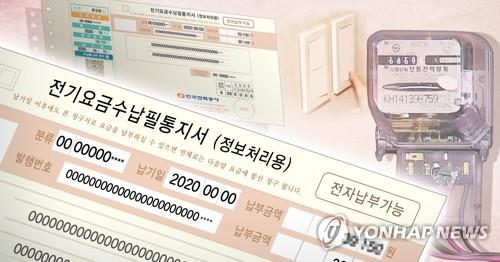-3.0 won per kWh following the first quarter… In the mid to long term, an increase is inevitable

[권도윤 제작] Photo composition/illustration
(Seoul = Yonhap News) Reporter Cho Jae-young = Government and KEPCO[015760]In the second quarter (April to June), the increase in electricity rates was delayed.
Accordingly, the fuel cost adjustment unit for the second quarter was set at -3.0 won per kWh following the first quarter.
On the 22nd, KEPCO announced electricity rates for the second quarter of this content on the KEPCO website.
This is the second adjustment since the introduction of the cost-linked rate system (fuel cost indexing system) this year.
Considering the rising trend in fuel costs over the previous three months, electricity rates for the second quarter were expected to rise in 7 years after November 2013, but were eventually held back.
KEPCO said, “The fuel cost adjustment unit price adjustment factor occurred due to the rise of international oil prices. “I received a notice of a reservation from the government in order to promote the stability of the lives of the people who suffer,” he explained.
In addition, the government notified KEPCO that it is necessary to keep the adjusted unit price in the second quarter the same as in the first quarter (-3 won/kWh) by utilizing the unadjusted amount generated when determining the adjusted unit price in the second quarter.
With the introduction of the fuel cost indexing system, the government has announced a policy to withhold the rate adjustment in exceptional circumstances such as a sharp rise in oil prices within a short period of time.
The decision to hold this time seems to reflect concern that an increase in electricity rates may stimulate public prices.
In addition to the fact that the economy of the common people is difficult due to Corona 19, it is judged that there is a concern that the burden of the common people may increase if even the public charge rises in a situation where the price of the table is rapidly jumping.
According to the decision to reserve, for a 4-person household that uses an average of 350 kWh per month in the second quarter, the cut effect is expected to continue by up to 1,50 won per month in the first quarter.
The fuel cost indexing system reflects the fuel cost related to electricity production, such as liquefied natural gas (LNG), coal, and oil, in the electricity rate every three months.
The change in fuel cost is the value obtained by subtracting the’standard fuel cost’ from the’performed fuel cost’. The actual fuel cost refers to the average fuel cost for the previous three months, and the standard fuel cost refers to the average fuel cost for the previous year.
As international oil prices are on an uptrend in line with the recent global economic recovery, it is generally expected that an increase in electricity rates will be inevitable in the future.
Unauthorized reproduction-redistribution prohibited>
2021/03/22 10:22 sent
